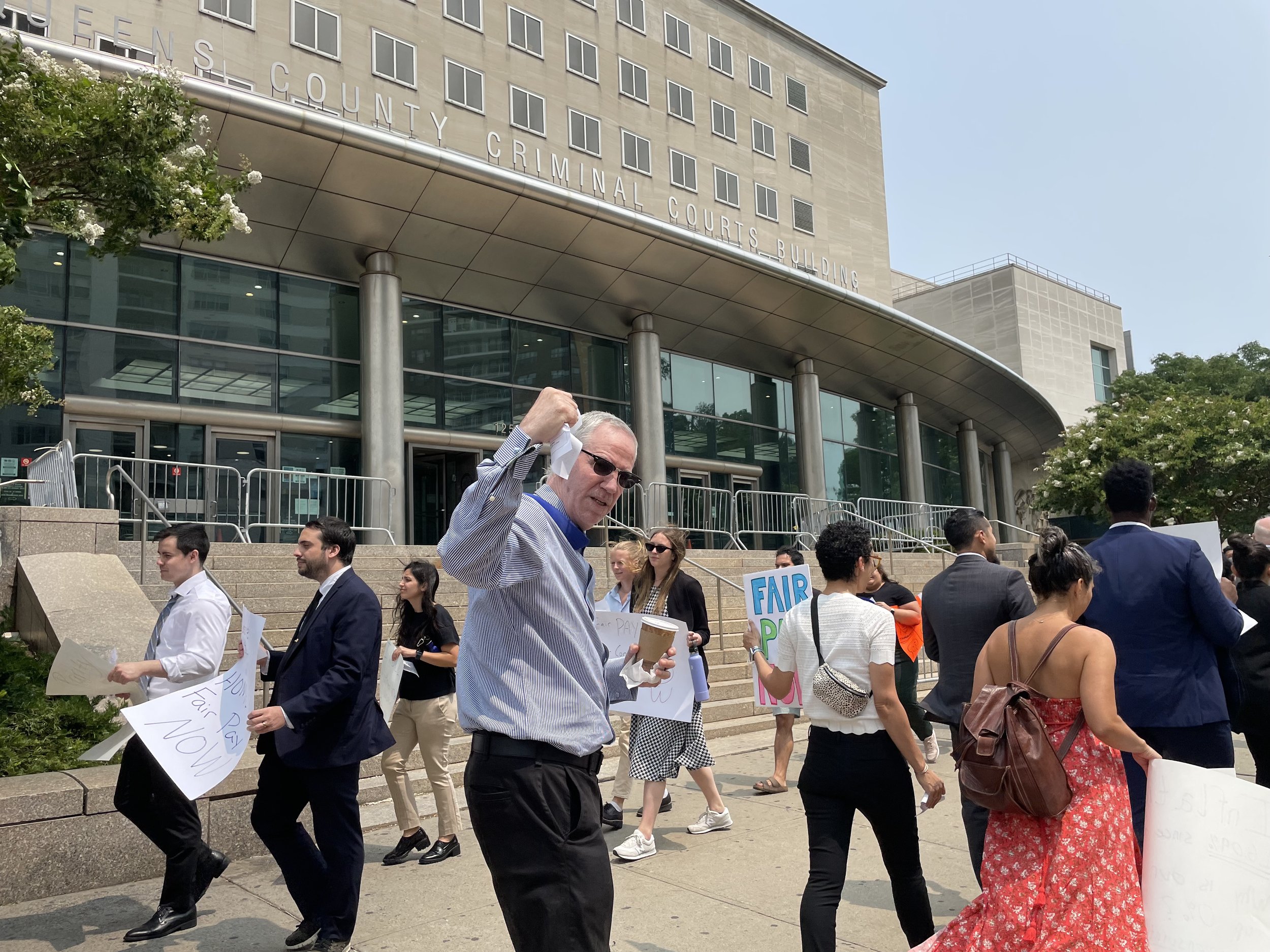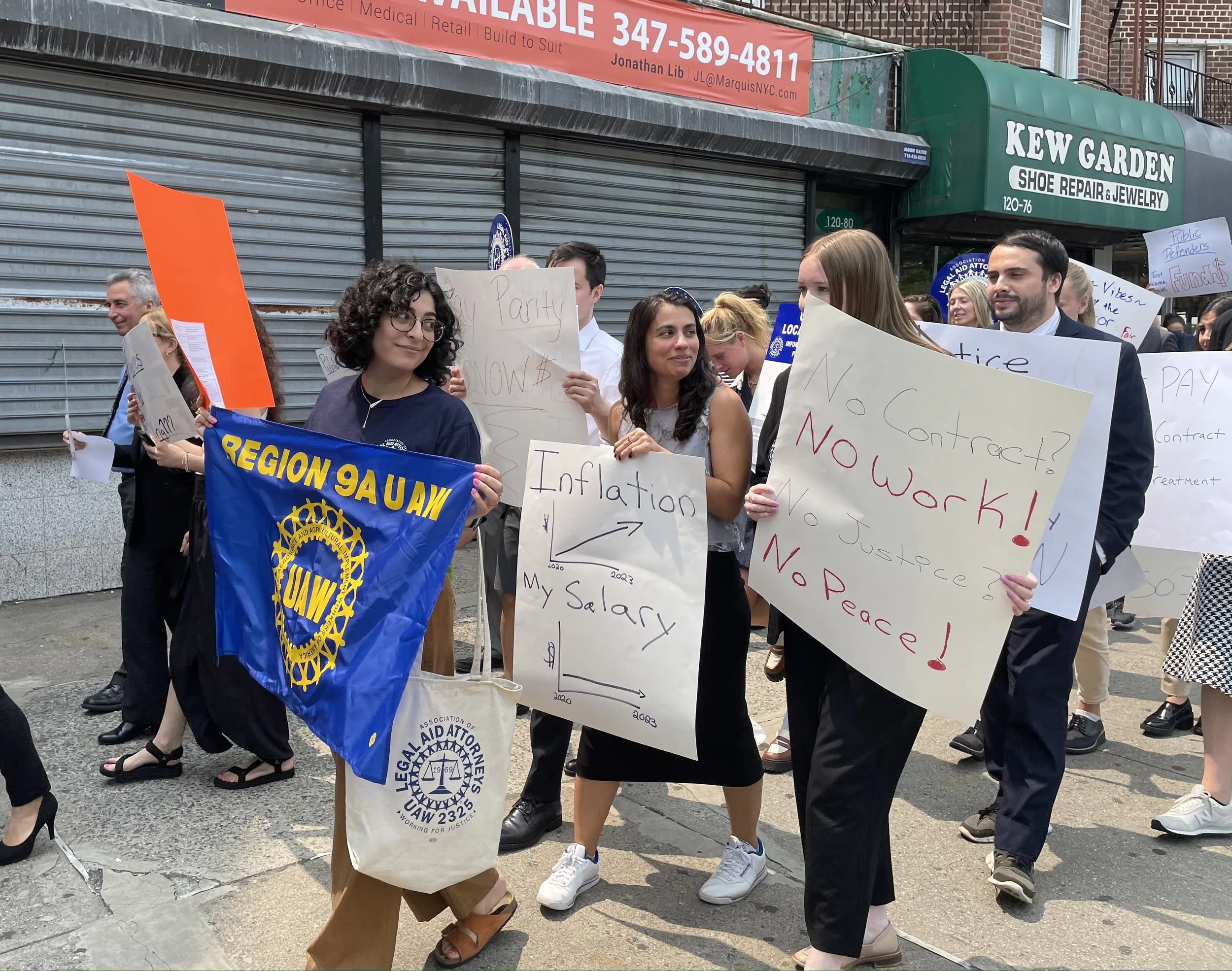Public defenders call for better pay, case caps and transparent negotiations in Queens
/Attorneys with the Legal Aid Society picketed their employer in front of Queens Criminal Court on Thursday, Aug. 3, 2023. Eagle photo by Jacob Kaye
By Jacob Kaye
Public defense attorneys across the city picketed their employer on Thursday as contract negotiations between their union and the city’s largest public defense firm continue.
Members of the Association of Legal Aid Attorneys – UAW Local 2325 picketed the Legal Aid Society on Thursday at five locations throughout the city, including in front of the Queens County Criminal Courthouse on Queens Boulevard.
With the city’s budget finalized and the Legal Aid Society’s financial outlook for the coming year a little more clear, attorneys demanded the public defense firm sit down and negotiate with their union, which has been operating without a contract for a full year.
“Much of the delay and the excuses we were provided were that we were waiting on funding,” said Atusa Mozaffari, a housing attorney with the Legal Aid Society who works in Queens. “The fiscal year is closed and yet we're still without a contract.”
At the heart of the attorneys’ complaint is that they’ve been asked to do more work without an increase in pay, even as the costs of living and working in New York City continue to increase.
New laws – including the city’s Right to Counsel law and changes to the state’s discovery laws – have increased the number of indigent New Yorkers in need of representation, as have precarious post-pandemic economic conditions in the city, state and country.
The crush of new cases has driven a number of senior public defense attorneys away from the firm. After leaving, their cases have been transferred over to the attorneys who remain, and who likely already had seen an increase in their own caseload before taking on a colleague’s cases. Facing their own mounting caseloads, those attorneys have been pushed toward leaving the firm and public defense all together, ALAA says.
“The Legal Aid Society owes it to our clients and they owe it to the attorneys to provide a fair contract now to stop The Great Resignation,” a flier handed out by members of the union on Thursday reads.
It’s a self-perpetuating cycle of high caseloads and increasing attrition that the attorneys say can only be solved by increasing pay for attorneys at the lowest through the highest levels of experience, capping caseloads for attorneys working in Civil Court and generally making the city’s largest public defense firm a desirable place to work.
Overall, the Legal Aid Society currently has 300 open positions and around 2,000 employees, according to a LAS spokesperson.
Mozaffari, who has worked at the firm for seven years, said that the Legal Aid Society’s Queens Housing Court office has around 4 mid-career attorneys, five senior attorneys and around 10 junior attorneys, and that in the past year, the office has lost 15 attorneys.
“I've seen very few people stay as long as I have,” Mozaffari said. “It's a shame because they are all dedicated, they all want to help the client population that we serve, but there simply aren't enough people.”
Mozaffari’s office had been particularly impacted by the city’s Right to Counsel program, which requires that New Yorkers of a certain income threshold be connected with an attorney when facing eviction proceedings.
Atusa Mozaffari (left) is a housing attorney with the Legal Aid Society who works in Queens. She helped lead the Association of Legal Aid Attorneys – UAW Local 232 picket in front of Queens Criminal Court on Thursday, Aug. 3, 2023. Eagle photo by Jacob Kaye
Though Mozaffari and the Legal Aid Society in general has been supportive of the program, they agree that without additional funding and additional attorneys, it is unsustainable.
“We can't represent everyone in the city,” Mozaffari said. “It's such a wonderful pilot, but without Legal Aid and the city really making it feasible, the project will be an absolute bust, despite its very good intentions and very necessary applications.”
Similar case increases have been seen in the dockets of criminal defense attorneys.
As a result of the state’s recently reformed discovery laws, prosecutors have been dumping mounds of evidence in cases on public defense attorneys, despite the firms not bringing on additional attorneys or staff to sort through it, union members say.
Pauloma Martinez, a criminal defense attorney who has worked for the Legal Aid Society in Queens for a little more than a dozen years, told the Eagle during a previous ALAA picket in February that the laws had impacted her work.
On Thursday, Martinez said that little had changed since the February lunchtime picket.
“More cases, the same amount of money, more inflation, more people leaving – so, basically exactly the same, but worse,” she said.
According to Martinez, Legal Aid is expected to make the union an offer in the coming week, a timeline that was not confirmed by a Legal Aid spokesperson.
Thus far, the union and law firm have had 13 bargaining sessions. The union claims the Legal Aid Society has yet to meaningfully negotiate salary increases for the current fiscal year – starting salaries at the Legal Aid Society for attorneys coming straight out of law school is around $70,000.
In a statement, a spokesperson for the Legal Aid Society blamed the city and state for failing to work the necessary funds to support public defenders into their respective budgets. The state included a portion of funds in its budget to address discovery work specifically, and the city included $46 million in funding for legal services providers, falling drastically short of the approximately $190 million public defender firms requested.
“The historic failings of both the State and the City to meaningfully address the funding needs of public defender organizations and civil legal services providers has led to unprecedented attrition, high workloads and our inability to pay our staff the wages that they deserve for their invaluable work,” LAS’ spokesperson said.
“Over the last several months, in response to our advocacy, we have secured additional resources from our funders, and each day we continue to analyze ways in which we can issue increased compensation for all staff, but we know this is far from sufficient,” the spokesperson added. “We agree with our unions that the situation is untenable, and we echo their call on both Albany and City Hall to prioritize our needs to ensure that the people we represent continue to have the zealous representation that they are entitled to.”
In addition to increases in salaries, the union is pushing to include several other stipulations into their contract with the Legal Aid Society.
Among them is a case cap for attorneys working in Civil Court – Legal Aid Society attorneys working in the criminal practice currently have a cap on the number of cases they can have on their docket at any one time.
The attorneys are also calling for the right to a paid sabbatical – currently, attorneys can take a sabbatical but it will not be paid.
They are also demanding the Legal Aid Society create and share a plan to address their attrition crisis.
“This can't be tolerated – it's an untenable and unsustainable position for all the attorneys,” Mozaffari said. “Hopefully, as contract negotiations continue, our voices will be heard and we'll get the things we deserve.”





